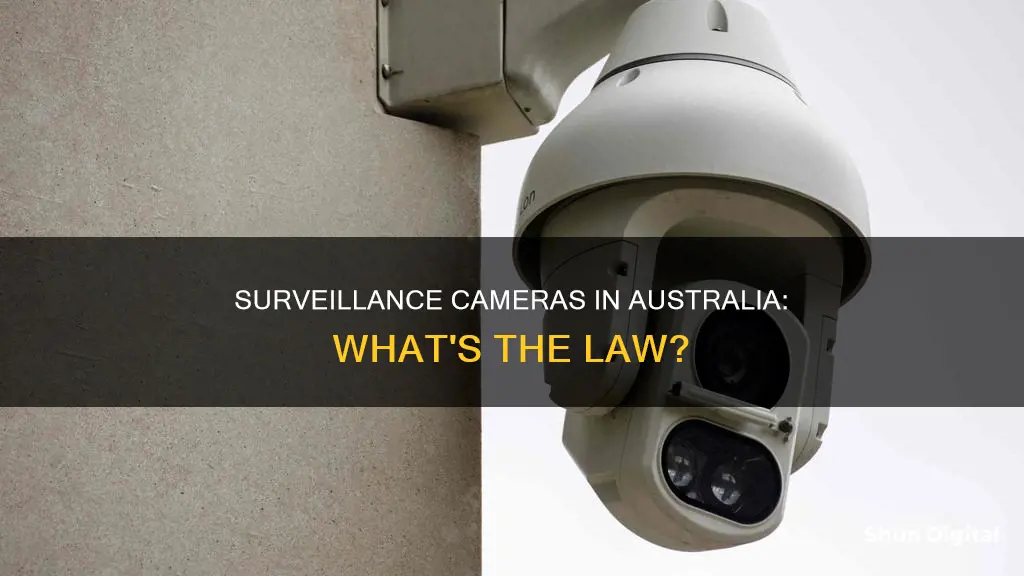
The use of surveillance cameras in Australia is a complex and evolving legal area, with a mix of legislation and common law at both the state and federal levels. While there are laws in place to protect privacy, this is not absolute, and the rapid development of technology continually challenges the legal framework. The laws regulating filming and distributing footage vary across jurisdictions, and the rights of citizens to privacy must be balanced with legitimate interests in surveillance.
| Characteristics | Values |
|---|---|
| Privacy Act 1988 | Does not cover security cameras operated by individuals acting in a private capacity |
| Surveillance Devices Act 2007 (NSW) | Regulates the installation, use, maintenance and retrieval of surveillance devices in NSW |
| Workplace Surveillance Act | Relevant where a home is also a "workplace" |
| Invasion of Privacy Act 1971 (Qld) | Makes it an offence to audio record a private conversation you are not involved in |
| Telecommunications (Interception and Access) Act 1979 | Makes it an offence to intercept telecommunications |
| Criminal Code (Qld) | Makes it an offence to video record people without their consent in places where they would expect to be private, such as a bedroom, bathroom, or changeroom |
| Body Corporate and Community Management Act 1997 (Qld) | Property owners may be in breach if the use of surveillance cameras causes a nuisance to common property |
| Planning laws | The installation of surveillance cameras that intrude on the privacy of neighbours may be a planning issue regulated under councils' development control powers |
| Common law | It is possible to make a common law claim of nuisance on the basis of unreasonable interference with the enjoyment of your property |
What You'll Learn

Surveillance cameras in private residences
It is legal to install security cameras in private residences in Australia. However, there are laws and guidelines that must be followed regarding the use of surveillance devices, and these differ across states and territories.
Surveillance Laws in Australia
The Surveillance Devices Act 2007 (NSW) regulates the installation, use, maintenance, and retrieval of surveillance devices in New South Wales. A 'surveillance device' includes data surveillance devices, listening devices, optical surveillance devices, and tracking devices.
Private Residences
If you are considering installing security cameras in your private residence, it is essential to be aware of the relevant laws and guidelines in your state or territory. Here are some general guidelines and recommendations to consider:
- Communication and Consent: If your security cameras capture areas where individuals have a reasonable expectation of privacy, such as your neighbour's backyard or pool, it is recommended to communicate with your neighbours and obtain their consent. This is particularly important if your cameras record audio, as most states and territories have stricter laws regarding audio recordings compared to video footage.
- Privacy: Avoid installing cameras in areas where individuals have a reasonable expectation of privacy, such as bathrooms and bedrooms.
- Local Laws and Strata By-Laws: Check with your local council and review any strata by-laws to ensure compliance with local regulations. Some councils require planning permission for security cameras.
- Distribution and Sharing: Even if you have obtained consent for recording, always seek legal advice before sharing or distributing any footage or audio recordings.
- Professional Installation: If you opt for professional installation, ensure you hire a licensed technician.
- Security: Be aware that there is a privacy risk associated with private surveillance cameras, as they can be hacked and accessed by unauthorised individuals. Ensure you take the necessary steps to secure your devices and protect your privacy.
State-by-State Breakdown:
New South Wales (NSW)
The Surveillance Devices Act 2007 (NSW) allows for the installation of security cameras unless the owner of the property denies it. Renters should check with their landlords. You may need the consent of neighbours if your cameras are pointed at their homes.
Victoria
According to the Surveillance Devices Act 1999 (Vic), audio recordings of conversations are permissible if the person operating the device is involved in the conversation and has the consent of the other parties. It is illegal to record private activities without permission.
Queensland
In Queensland, it is essential to respect your neighbours' privacy and not record them without their consent in places they can reasonably expect privacy, such as bedrooms and bathrooms. If neighbours feel their privacy is violated, they can complain to the Queensland Police Service or a community mediation service.
Western Australia (WA)
In Western Australia, private conversations that an individual is not part of should not be recorded. Even if you are involved in the conversation, you need the consent of all participants. The same applies to visual recordings of private activities.
South Australia (SA)
South Australia prohibits the audio recording of private conversations and the recording of private activities without the express consent of all involved parties.
Tasmania
It is illegal to audio record private conversations in Tasmania, even if you are part of the conversation. However, there are exceptions, including imminent threats of serious violence or substantial property damage. At the time of writing, there were no specific laws regarding video-only recordings.
Northern Territory (NT)
The Surveillance Devices Act 2007 (NT) prohibits recording private activities and any audio recordings of private conversations without the implied or explicit consent of all involved parties.
Australian Capital Territory (ACT)
The Listening Devices Act 1992 (ACT) makes it an offence to record private conversations, even if you are involved in the conversation or have obtained consent. This Act only addresses audio recordings and does not provide guidance for visual recordings.
While it is legal to install security cameras in private residences in Australia, it is crucial to be mindful of the privacy rights of others and to comply with the relevant laws and guidelines in your state or territory. Always seek legal advice if you are unsure about the legality of your actions.
Finding the Mode Button on the Hero 5 Camera
You may want to see also

Surveillance in the workplace
The use of surveillance in the workplace is an increasingly common practice, aided by technological advancements. In Australia, there is no general right to privacy, and instead, privacy is regulated by a complex web of federal, state, and territory laws. This makes it unclear whether employers are permitted to monitor their employees, and to what extent.
The federal Privacy Act 1988 and the Australian Privacy Principles (APPs) grant employees across Australia a right to personal privacy, even while performing their job duties. Employers should respect their employees' privacy and ensure that any surveillance measures are reasonable, proportionate, and necessary for legitimate business needs. Intrusive or excessive surveillance that goes beyond what is necessary may infringe on employees' privacy rights.
In most states, employees must be notified about the presence of surveillance in the workplace. This can be done through clear policies, employment contracts, or workplace agreements. For certain types of surveillance, such as the use of listening devices, employers must not only inform the employee but also obtain their consent. When consent is required, it must be freely given, informed, and voluntary.
There are specific areas of a workplace that are off-limits to monitoring, including toilets, changing rooms, and shower facilities. It is crucial that any permitted surveillance does not inadvertently record areas where employees have a higher expectation of privacy.
Covert workplace surveillance, or surveillance conducted without the knowledge of employees, is strictly prohibited in many parts of Australia. However, exceptions exist for employers who have obtained authority through the courts. For instance, in New South Wales, a magistrate can authorise surveillance for the purpose of monitoring unlawful workplace activities.
Employers who install surveillance cameras should also be mindful of neighbouring properties. While there are currently no laws specifically restricting the use of surveillance systems in residential settings, it is advisable to avoid filming areas where individuals have a reasonable expectation of privacy.
Charging Your Spy Watch Camera: A Step-by-Step Guide
You may want to see also

Surveillance in public spaces
Surveillance cameras are legal in Australia, but there are laws that regulate their use. The Privacy Act 1988 covers Australian Government agencies and organisations with an annual turnover of more than $3 million, and some other organisations. The Act requires that people be informed that their image may be captured before they are recorded, and that any recorded personal information is secure and destroyed or de-identified when it is no longer needed.
The Surveillance Devices Act 2007 (NSW) regulates the installation, use, maintenance and retrieval of surveillance devices in NSW. It is an offence to use a listening device to record a private conversation without the consent of all parties, or to install, use or maintain an optical surveillance device on or within premises or a vehicle to record or observe an activity without the consent of the owner or occupier of the premises or vehicle. It is also an offence to use a tracking device to determine the geographical location of a person without their permission.
The Telecommunications (Interception and Access) Act 1979 (Cth) protects the privacy of individuals who use the Australian telecommunications system. It is an offence to intercept, authorise, or permit another person to intercept a communication passing over a telecommunications system.
In Australia, there is a perception that surveillance cameras are everywhere. A study of young people's perceptions of surveillance and security in Melbourne found that participants were aware of the types and locations of surveillance around the city. The study also found that while some advantages of surveillance were recognised, such as the ability to identify attackers, most participants did not feel safer regardless of the presence of surveillance.
The study also found that young people felt they were disproportionately targeted by security guards, who stereotyped them because of their age and appearance. Interactions between young people and security guards were frequently negative and impacted their use of public spaces.
VGA Mode Camera: Understanding the Basics of This Technology
You may want to see also

Surveillance and privacy laws in Queensland
Queensland's surveillance and privacy laws are governed by both federal and state legislation. The state laws apply to Queensland government agencies and, in some cases, to individuals. The federal laws apply to large companies, private healthcare providers, and federal government agencies. Here is an overview of the relevant laws and their implications for surveillance and privacy in Queensland:
Queensland's Surveillance and Privacy Laws:
- Information Privacy Act 2009 (IP Act): This law applies to Queensland government agencies that collect, store, use, or disclose personal information. While it does not prevent agencies from using camera surveillance for legitimate purposes, it outlines specific privacy obligations that must be followed. Agencies must ensure that their camera surveillance systems are necessary and relevant for their intended purpose, considering factors such as camera location, position, and technical specifications. They must also take steps to make individuals aware of the purpose and authority for collecting personal information and provide clear signage about the use of surveillance cameras.
- Criminal Code: Section 227A of the Criminal Code makes it an offence to video record individuals without their consent in places where they have a reasonable expectation of privacy, such as bathrooms, bedrooms, or changing rooms. This applies to both individuals and organisations.
- Body Corporate and Community Management Act 1997: For properties that are part of a body corporate, exterior camera installation must comply with body corporate and community management obligations. Approval from the Body Corporate Committee may be required, and property owners must ensure that the use of surveillance cameras does not cause a nuisance to common property.
- Invasion of Privacy Act 1971 (IoP Act): This law makes it an offence to audio record private conversations that an individual is not involved in. However, if an individual is part of the conversation, they are allowed to record it, but with restrictions on how the recording can be used. For example, the recording cannot be communicated or published unless it falls under specific circumstances, such as being reasonably necessary in the public interest or for legal proceedings.
In addition to the above laws, Queensland does not have specific legislation regulating the surveillance of employees in the workplace. However, employers must balance their monitoring activities with their employees' and customers' right to privacy. Employers can legally monitor computer and internet use, as well as emails, as long as employees are aware of the surveillance.
Federal Laws:
- Privacy Act 1988: This law applies to large companies, private healthcare providers, and federal government agencies. It outlines the Australian Privacy Principles (APPs) that must be followed when handling personal information.
- Telecommunications (Interception and Access) Act 1979: This law protects the privacy of individuals using the Australian telecommunications system. It is an offence to intercept, authorise, or permit the interception of communications passing over a telecommunications system.
In conclusion, Queensland's surveillance and privacy laws aim to balance the legitimate use of surveillance with individuals' right to privacy. Both government agencies and individuals must comply with relevant laws when installing and operating surveillance devices, ensuring that personal information is protected and used appropriately.
RAW vs DNG: Why You Should Make the Switch
You may want to see also

Surveillance and privacy laws in New South Wales
The Surveillance Devices Act 2007 (NSW) regulates the installation, use, maintenance, and retrieval of surveillance devices in the state. This includes data surveillance devices, listening devices, optical surveillance devices, and tracking devices. It is illegal to use a surveillance device to record a private conversation or activity without the consent of all parties involved. The maximum penalty for this offence is 100 penalty units or imprisonment for 5 years, or both.
The PPIP Act, on the other hand, applies to NSW public sector agencies, including government agencies, local councils, and universities. The Act promotes the protection of personal and health information collected, stored, and used by these agencies to provide services to the public.
In addition to the Surveillance Devices Act and the PPIP Act, there are other laws and regulations in New South Wales that address privacy and surveillance. These include the Health Records and Information Privacy Act 2002 (NSW) (HRIP Act), the Workplace Surveillance Act 2005 (NSW), and the Telecommunications (Interception and Access) Act 1979 (Cth).
It is important to note that the laws surrounding surveillance and privacy are constantly evolving as technology advances. Individuals who plan to install surveillance cameras or use surveillance devices should exercise common sense and respect their neighbours' reasonable expectations of privacy.
Charging the Olympus SZ-14 Camera: A Step-by-Step Guide
You may want to see also
Frequently asked questions
Yes, it is legal to install surveillance cameras on your property. However, it is important to ensure that the cameras are not positioned in a way that violates privacy laws, such as recording areas where individuals have a reasonable expectation of privacy, like a neighbour's property or a bathroom/bedroom without consent.
Privacy laws regarding surveillance cameras vary across different states and territories in Australia. In Queensland, for example, Section 227A of the Criminal Code makes it an offence to video record people without their consent in private places such as bedrooms and bathrooms. In New South Wales, the Surveillance Devices Act 2007 requires users to notify individuals that they are being filmed or recorded.
Yes, surveillance camera footage can be used as evidence in court, but there may be restrictions on its admissibility. In some cases, covert surveillance footage may be inadmissible if the individual under scrutiny can prove public policy reasons for not allowing that type of filming.
Employers are required to inform their employees if there are surveillance cameras in the workplace, and that they may be recorded. In New South Wales, it is unlawful to engage in covert workplace surveillance unless authorised by a magistrate.







